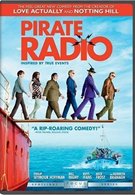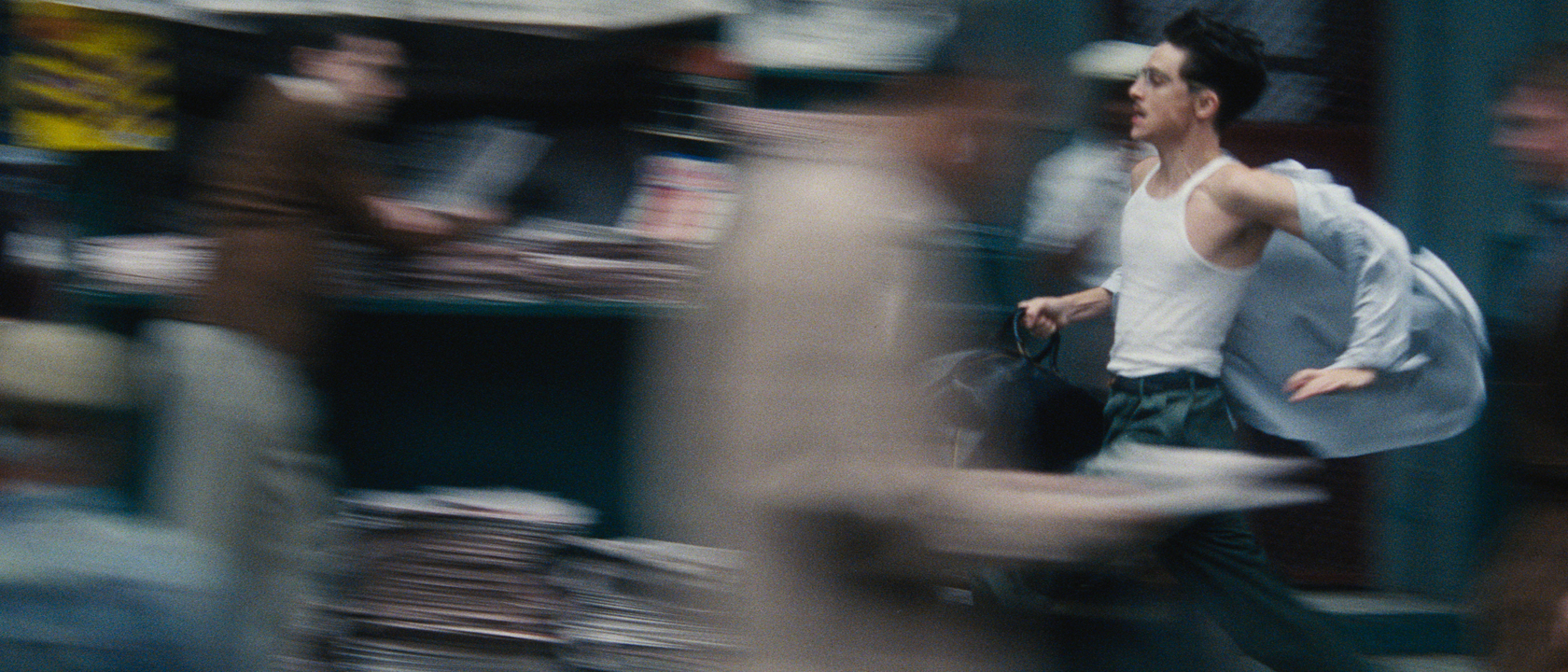Vogue calls Pirate Radio “exuberant.” As a second prominent voice in movie criticism, Elle describes Pirate Radio as “insanely pleasurable” (I know this because the DVD box told me). From what I can tell, no one has said moderately innovative. I, I beg to differ. Can a movie that is only loosely plot-driven and modestly entertaining find its driving force in a musical soundtrack that mimics an emotional kaleidoscope, an effect that, at the very least, adds on several half stars? Fuck yeah, it can. So, I’m glad in its American release the new film by Richard Curtis -- who is the guy who wrote Bridget Jones’ Diary and Four Weddings and a Funeral and also wrote and directed Love Actually, which my sister, the lover of love stories in my family, tells me is great -- is not called by its original title, The Boat That Rocked. That said, Pirate Radio is a film that spends a good bit of time iterating bad jokes, a good bit of time dicking around, a good bit of time tossing out badass music, all while spending the wrong amount of time with character development. I’m not going to waste energy on plot here, because let’s face it, there are a lot of little things going on and not too much that’s overtly important, and who needs another run-on sentence, anyway?
Here’s what you need to know: Young Karl (Tom Sturridge) has been sent by his mother (Emma Thompson) to stay on the pirate radio ship, Radio Rock, with his godfather (Bill Nighy) and a variety of other random DJs. This decision by his mother seems illogical because the boat is known for nothing but sex, drugs, and rock ‘n’ roll. As the story unfolds, the viewer finds that Karl may have been sent to learn more about his father, who is allegedly one of the DJs on the ship. Meanwhile, back on the mainland, agents of the British government (Kenneth Branagh and Jack Davenport) are campaigning against Rock Radio in an attempt to shut the station down. Various shenanigans go down, leading to a conclusion that is more ridiculous than poignant.
It’s shocking I mentioned a female character before I namedropped many of the other DJs, because it is the DJs (and young Karl) that this movie is inherently about. Those women who do make it aboard are too transient -- it becomes impossible to keep track of or care about any of them, which would be fine if the movie never attempted to introduce two legitimate female characters. Marianne (Talulah Riley) and Felicity (Katherine Parkinson) are unfortunately introduced, but they can’t move beyond the minimal breadth of roles that are defined by sex and sexual orientation.
Ms. Parkinson and Ms. Riley can hardly be faulted, as they are not the only things that fall flatter than their chests in this film. There are too many DJs to keep track of. You have The Count (Philip Seymour Hoffman), Gavin (Rhys Ifans), Angus (Rhys Darby), Simon (Chris O’Dowd), and Dave (Nick Frost), not to mention Thick Kevin and John The News Guy and Harold (Tom Brook and Will Adamsdale and Ike Hamilton) -- you get my point. This leads to a plethora of sideplots, which are hilarious, but it’s difficult to keep track of or care about all of the characters. Amidst all of its hootenanny, Pirate Radio does attempt to have a legitimate plot, however. The worst jokes seem to have been written into the script itself (a character named Twatt, really?); it is moments like these that make me wonder: perhaps if this film had been set up in the same manner as a Christopher Guest film, it might have saved itself. That, however, was not the case.
Let’s talk about the music. You have The Kinks, the Who, Jeff Beck, Smokey Robinson (The Man), Procol Harum, David Bowie, Otis Redding, the Moody Blues…there’s even a fuckin’ Seekers reference! It’s tricky to put music in a film. I’m not talking about some puffy, fluffed-up little piece of shit somebody pieced together on their off day, and I’m not talking about some fancy composition specifically written to suit a film; I’m talking about Rock ‘n’ Roll, baby. In Almost Famous, when music is integrated into the film, it is usually portrayed as part of an experience. A song will play that suits the scene emotionally, but, more interestingly, the actors are also involved with the music. In Pirate Radio, this is sort of the case. The DJs are playing music for the populace, but also for the people, so the film will flit back and forth between the DJs’ experience and that of their listeners. This doesn’t make the musical experience as intimate as that in Almost Famous, but the idea is new, and it is pretty awesome in its own right.
I will note that not every bit of culture appearing in Pirate Radio fits the “swinging sixties.” But this is historical fiction, baby, not historical fact. Roll with it. Because, honestly, the entire motto of the film seems to be: the more the viewer plays along, the more fun he or she will have. Watch all the deleted scenes, especially the “meaning of life” and the “radio sunshine” segments. And watch them with the commentary from Richard Curtis. He says at one point that you can’t cut anything that is plot oriented, which is true, but unfortunately, this meant a couple of awesome scenes were deleted to make the film shorter. While watching these scenes, I realized how many ideas were being tossed around that had to be cut. It’s a shame.
Honestly, special features on discs like this are normally a big waste. I had a great time watching all of the deleted scenes, so much so that I would watch them again -- which has never happened when I've watched the features on a disc before. Also, each of the features has commentary from Richard Curtis and it is almost an extra special feature of its own accord. Special features are often like big action films: a lot of pomp and fluff without much result; this disc is so much better than that, even if it didn't have to try as hard.
Your Daily Blend of Entertainment News

